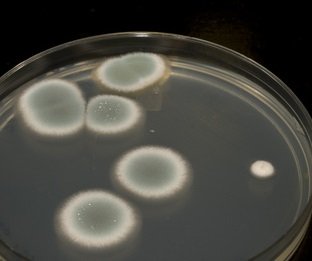Find a Mold Specialist Now
Click or Call, Toll-Free 24/7
Mold Identification
Proper mold identification techniques should be used if you suspect that there is a mold problem within your home. Even though all types of mold can be dangerous to your health, there are some mold types that can be more serious than others. A mold specialist can help you to identify the type of mold that is growing in your home, and they will also offer suggestions to help you clean up the mess in the safest way possible.
Identification Techniques
Many people begin the identification process by simply comparing the mold growth within their home with pictures that they find online. This mold identification process can be a good way to help you verify that it is actually a mold problem; however there are various mold types that may visibly appear to be the same, so it is difficult for an inexperienced person to identify the exact strain by simply comparing a picture.
Because the visual appearance of the mold is not always a sufficient testing procedure, mold specialists may take samples to look under a microscope. When the specific mold types are determined, the information can be used to assist in medical treatment processes as well as choosing the best cleanup procedures that should be used.
Mold Types
During the mold identification process, it is a good idea to be familiar with the mold types that are commonly found in your area. Some of those types may include:
- Aspergillus: Also known as common household mold, this mold can grow in many different colors and on almost any surface.
- Toxic Black Mold: Even though this mold is assumed to be black in color, it can also appear to be green. Toxic black mold is one of the mold dangerous types of mold, and it can cause severe health problems when exposure occurs.
- Food Mold: The type of mold that grows on food is usually penicillium, and it often has a blue, green, or white color to it. Any food with mold growth should be immediately thrown away because it is not safe for consumption.
Even though there are different types of mold, don’t be fooled into thinking that mild forms of mold are not dangerous to your health. Some people may assume that the color or location of the mold may indicate that there is less of a health risk, but the only way to determine the health risk is by consulting with a professional to identify the severity of the problem.
Professional Mold Services
Hiring a professional can be an effective way to make the mold identification process simple. A professional mold specialist has experiencing working with various types of mold, and they can often identify the type of mold in your home based on appearance and a few simple tests.
Once mold growth has been confirmed, the cleanup process should begin immediately. Some people prefer to hire a specialist to deal with the cleanup procedures, while others want to do the work on their own. Even if you decide to clean up the mold by yourself, you should still have testing done to verify that the problem has been fully eliminated.
A testing professional has special equipment that can be used to test for mold spores in the air, and they may help you to identify continued problems even if you think that the area has been cleaned up. This will cost you a little bit of money, but don’t worry because it is well worth the cost to verify that you and your family are safe from the dangers of mold exposure.
3 Benefits of Mold Testing by a Specialist
- The mold testing process is in-depth, and requires specialized skills to get an accurate reading. Most mold specialists are actually engineers.
- A specialist will advise you on safety precautions to help you avoid harmful exposure before and during the cleanup process. If proper safety precautions are not taken, the mold spores may be inhaled as they become airborne.
- A report will be given to you, showing the specific protocol that needs to be followed to ensure that the mold is completely eliminated. Failure to follow these steps could result in the mold growing back, and becoming even worse as it spreads.
To find a certified mold tester in your area, just follow this link. Don’t wait to get your home tested if you suspect you have a mold problem. Some types of mold can be very hazardous to your health.
Return From Mold Identification To Our Types Of Mold Page
Black Mold Health Symptoms Home Page





